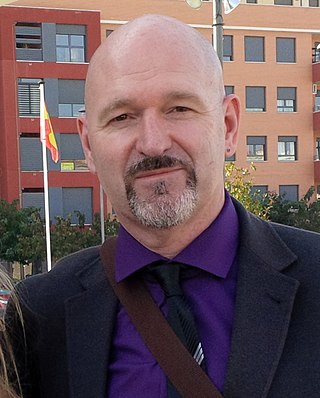Premio Nadal is a Spanish literary prize awarded annually by the publishing house Ediciones Destino, part of Planeta. It has been awarded every year on 6 January since 1944. The Josep Pla Award for Catalan literature is given at the same ceremony.

Sebastián Oscar Rulli is an actor and model. Born in Argentina, he has spent most of his professional career in Mexico, becoming a dual Argentine and Mexican citizen.

María de la Almudena Grandes Hernández was a Spanish writer. Author of 14 novels and three short-story collections, her work has been translated into twenty languages and frequently adapted to film. She won the National Literature Prize for Narrative and the Prix Méditerranée among other honors. Spanish Prime Minister Pedro Sánchez called her "one of the most important writers of our time."
The Premio Azorín de Novela is one of the most important literary awards for works written in the Spanish language. It was originally created by Spain's Ministry of Information and Tourism in 1970. The modern form of the award was created in 1994, by the Spanish provincial government (diputación) of Alicante together with Editorial Planeta.

Ángela Becerra Acevedo is a Colombian writer. She has won several awards such as the Premio Fernando Lara de Novela in 2019, the Planeta-Casa de América Award in 2009, the Azorín Prize in 2005 and four Chicago Latin Literary Awards, as well as the Premio Iberoamericano Planeta-Casa de América de Narrativa. Her works have been translated into 23 languages and published in more than 50 countries. She is one of the most widely read Spanish-speaking authors, the most read Colombian writer after Gabriel García Márquez, and considered the creator of the Magical Idealism.

Sergio Olguín is an Argentinean author, journalist and literary critic born on 29 January 1967 in Buenos Aires. Whereas most of the novels that he has published to date can be categorised as youth literature, he has also published stories and novels that do not fall in this category.
The Alfaguara Novel Prize is a Spanish-language literary award. The award is one of the most prestigious in the Spanish language. It includes a prize of US$175,000 making it one of the richest literary prizes in the world. It is sponsored by Alfaguara, a publisher owned by Penguin Random House.
Literary Short Novel Casino de Mieres (Premio de Novela Casino de Mieres) is a Spanish literary prize awarded annually since 1980 in Mieres (Asturias) to an original and unpublished short novel. It is selected by an Award Committee consisting of great personalities from Asturias Literary and Arts circle.

Alberto José Barrera Tyszka is a Venezuelan writer. In 2006, he received the Herralde Prize for his novel La enfermedad.

Esteban Navarro Soriano is a Spanish novelist.
Antonio Colinas Lobato is a Spanish writer and intellectual who was born in La Bañeza, León, Spain on January 30, 1946. He has published a variety of works, but is considered to be above all a poet. He won Spain's National Prize for Literature in 1982, among several other honors and awards.
The Premio Herralde is a Spanish literary prize. It is awarded annually by the publishing house Anagrama to an original novel in the Spanish language. Established in 1983, the prize takes its name from Jorge Herralde, founder of Anagrama. Accompanied by a cash prize, the award is announced every year in November.
The National Novel Award is one of the main literary awards given annually in Bolivia. It is convened by the Ministry of Cultures, and originally sponsored by Grupo Santillana, through the Alfaguara publishing house. It was established in 1998 to promote the dissemination of Bolivian literature in the novel genre and better awareness of its authors.

Máximo Huerta Hernández, also known as Màxim Huerta, is a Spanish journalist, writer, television celebrity and former politician.
Clara Obligado Marcó del Pont is an Argentine-Spanish writer.
The Tigre Juan Award is a Spanish literary award created in 1977 in honor of the novel Tigre Juan. El curandero de su honra by Ramón Pérez de Ayala. It is awarded to the best narrative work in Spanish published in the preceding year. It has had different sponsors: the founders, the Cervantes Bookstore, the Asturian Center, the City Council of Oviedo (1986–2009) and the Tribuna Ciudadana cultural association.
The Premio Biblioteca Breve is a literary award given annually by the publisher Seix Barral to an unpublished novel in the Spanish language. Its prize is €30,000 and publication of the winning work. It is delivered in February, to a work from the preceding year.
The Setenil Award is a literary prize for the best short story book published in Spain. Convened annually since 2004 by the municipality of Molina de Segura in Murcia, it is one of the most prestigious in the country. As of 2018 it confers an economic endowment of €10,000, and the city council publishes a reprint of the winning work.
The Felipe Trigo Awards are annual literary honors created in 1981 on the initiative of the City Council of Villanueva de la Serena, Spain. On 24 November 1980, the Municipal Assembly agreed to institute it as a tribute to the writer Felipe Trigo, born in the city in 1864.

Octavio Escobar Giraldo is a Colombian physician and writer. He won the International Short Novel Award Ciudad de Barbastro XLV (2014) and the National Award for Best Novel from the (Colombian) Ministry of Culture (2016) for Después y antes de Dios. His narrative style is substantially influenced by television, music, cinema because, as he himself states, he went more to the movies than to class. He is the Director of the Manizales Book Fair, which he founded in 2009. He is a professor at the graduate school of Fine Arts and Humanities at the University of Caldas, located in the city where he was born, Manizales, Colombia. His trio of noir novels take on difficult social themes pertaining to the violence, the paramilitaries, and the false positives scandal, the over six thousand young people who were kidnapped and murdered by the Colombian military to meet quotas in the war against the guerrilla forces in the Colombian coffee growing axis, the mountainous region where the author was born and has spent his life.










